
The 31st Raindance Film Festival marks Malaika Bova and Martyna Szmytkowska’s inaugural edition as artistic directors, and the pair are keen to retain the festival’s focus on platforming debut and early career filmmakers while refining its output.
“We thought we would focus on quality of the content, and also quality of our service to the filmmakers. By keeping it so compact, we managed to have a one-to-one relationship with all of the filmmakers,” says Bova, of the festival which opens today (October 25) in London, running until November 4.
She describes it as a “boutique” festival. This year, 38 features have been programmed, compared to over 100 in previous years. Sidebars have been done away with, and competition sections have been expanded, with four competitive sections covering documentary, first-time filmmakers (debuts can also appear in other sections), international and UK titles.
“We’re comparable to the South By Southwest of the UK,” adds Bova. “These festivals keep an open mind on first- time filmmakers and creativity that is still not very set and organised. We keep an eye on things that are technically not incredibly refined, but have a strong voice and have something to say to the world.”
Jurors include filmmakers Duncan Jones and Michael Winterbottom; actors Rory Kinnear, Sope Dirisu and Vinette Robinson; and industry figures such as Hanway’s Genevieve Segall, Mubi’s Natalie Ralph and the BFI’s Jason Wood.
Another change that will come into play from 2024 is moving the dates from November to June, in an effort to move away from the BFI London Film Festival’s October slot.
Both Bova and Szmytkowska have previously been instrumental in the festival’s programming team, and were promoted to artistic directors in October 2022, but did not act in the artistic director capacity throughout the preparations for last year’s edition. Founder Elliot Grove remains CEO, while his co-founder Suzanne Ballantyne is head of programming.
The festival’s model leans on submissions, with around 1,000 feature films entered each year – the majority coming from the US. “The festival is very indie, and the US has a very strong culture of indie filmmaking,” observes Szmytkowska.
In addition, the team is in touch with sales agents and distributors for possible titles to programme.
Raindance is made possible by a team of 50 film student pre-selectors and freelancer programmers, and a core team of around 10 full-time employees running the festival. Funding comes predominantly from the submissions and sponsorship, with some public money – such as support from Tower Hamlets council.
West End return
Raindance is back in London’s West End this year, after focusing its screenings in neighbourhood London cinemas in recent years. “In terms of attraction for filmmakers, the West End is quite appealing,” says Bova. Cinemas taking part include Covent Garden’s Garden Cinema, Vue Piccadilly, Curzon Soho and Curzon Mayfair. The industry hub and the Raindance Immersive VR Showcase is this year hosted at Wonderville on Haymarket.
Genesis Cinema in London’s East End remains a stronghold local cinema, where Black cinema supporter and distributor We Are Parable will screen a series of shorts it has programmed for the festival that honour the UK’s Black history month. Tower Hamlets council is also partnering in outreach with the local community.
Raindance has partnered with the likes of gender equity campaign group Reclaim The Frame and Nadia Denton of the Beyond Nollywood collective to reach out to specific communities and audiences.
Programme highlights

This year’s territory focus is on Catalan films, and Raindance is closing with Catalan filmmaker Isabel Coixet’s San Sebastian premiere Un Amor – a more experienced filmmaker than typical for Raindance. It is opening with UK actor-tuned-director Jack Huston’s Venice debut Day Of The Fight.
Further programme highlights include Mountain Onion – the debut film by Kazakhstan director Eldar Shibanov which played at the Red Sea International Film Festival in 2022, about a young boy who attempts to save his parents’ marriage by trying to source some mythical golden Viagra. “We keep referring to it as like a Wes Anderson from Kazakhstan,” says Szmytkowska.
Inna Sahakyan’s Aurora Sunrise is another title the artistic directors’ feel excited about. The animated documentary, which premiered at Annecy earlier this year, tells the true story of Aurora Mardiganian, who survived the Armenian genocide in 1915, but went on to catch the attention of Hollywood.
What connects all the programmed films, say Bova and Szmytkowska, is an uninhibited spirit. “We’re very much dealing with first-time filmmakers, they very often don’t have any big backers at that stage. They are free in terms of budgeting, and the content they put in their film, and that’s what independent film means for us,” says Szmytkowska.
“The creative team behind a film has a lot to say freely, without constraints of external stakeholders.”















![[L-R]: Amanda Villavieja, Laia Casanovas, Yasmina Praderas](https://d1nslcd7m2225b.cloudfront.net/Pictures/274x183/6/4/1/1471641_pxl_20251224_103354743_618426_crop.jpg)








![[L-R]: Amanda Villavieja, Laia Casanovas, Yasmina Praderas](https://d1nslcd7m2225b.cloudfront.net/Pictures/100x67/6/4/1/1471641_pxl_20251224_103354743_618426_crop.jpg)
No comments yet